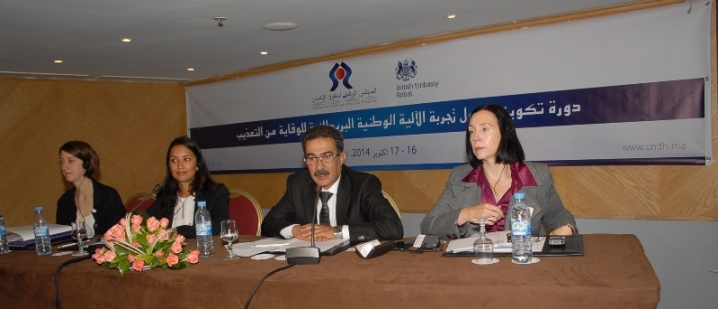CNHD calls on government to designate NPM against torture as soon as possible

The CNDH and the British Embassy in Rabat held on the 16th and 17th of October in Rabat an experience-sharing workshop on the UK’s National Preventive Mechanism, designated in implementation of the Optional Protocol to the Convention against Torture and other Cruel, Inhuman or Degrading Treatment or Punishment (OPCAT).
Speaking at the opening session of this workshop, attended by Smita Rossetti, Deputy Head of Mission of the British Embassy in Rabat, Mohamed Essabbar, CNDH Secretary General, called on the Moroccan government to deposit the ratification instruments of the OPCAT, ratified by Morocco in July 2013, and swiftly designate the National Preventive Mechanism as soon as possible.

The CNDH released a comparative survey on the NPM experiences in many countries, highlighting their powers, structures, financial and institutional autonomy, activities, founding legislations, etc. Many countries, the survey found, opted for designating their existing national human rights institutions to play the role of the national torture preventive mechanism.
The CNDH’s ambition to play this role, Mr. Essabbar said, is therefore legitimate, especially if we take into consideration its effective role in the protection and promotion of human rights in Morocco, including torture, and its visits to the places of deprivation of liberty and its pertinent recommendations and reports.
The CNDH invited two UK experts, Louise Finer, the senior policy officer at Her Majesty’s Inspectorate of Prisons (HMIP) and overall coordinator of the Mechanism’s activities, and Kellie Reeve, one of UK senior Prisons Inspectors.
The UK’s National Preventive Mechanism was designated in March 2009. It is currently made up of 20 visiting or inspecting bodies, coordinated by HM Inspectorate of Prisons (HMIP). Two UK experts, Louise Finer, the senior policy officer at He Majesty’s Inspectorate of Prisons (HMIP) and overall coordinator of the Mechanism’s activities, and Kellie Reeve, one of UK senior Prisons Inspectors, was invited by the CNDH to share the NMP’s experience in inspecting prisons, police and court custody, immigration and military detention facilities, its recommendations to government, etc..






















